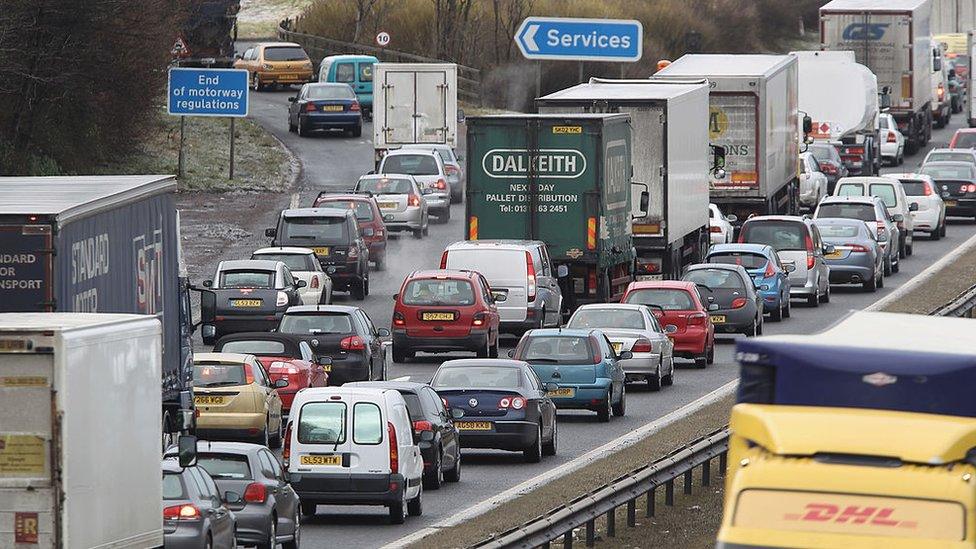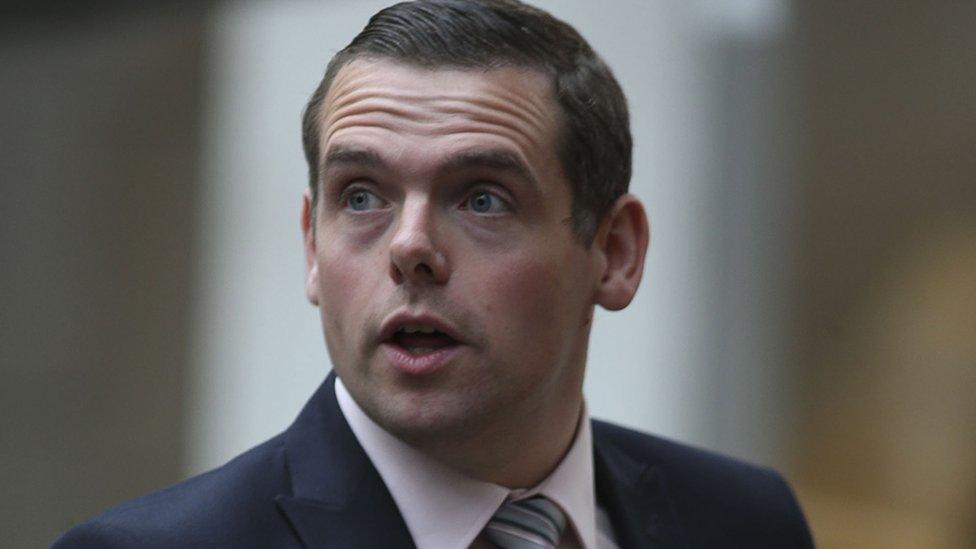Scottish Conservatives want three-lane M8 to help 'power up' Scotland
- Published

Mr Ross has proposed an upgrade to the M8 link between Glasgow and Edinburgh
The Scottish Conservative leader has called for "massive" investment in transport infrastructure including widening the M8 to three lanes.
Douglas Ross said the country had been economically divided for too long and that big projects would bring people "closer together".
He told BBC Scotland his "power up Scotland" plan would focus on getting the unemployed back into work.
The resulting increase in tax revenue would help fund the projects, he added.
Mr Ross will unveil his first big policy announcement since being appointed leader at an event in Inverness later.
The Moray MP is proposing;
a new "fully integrated" transport system with smart travel cards
an M8 featuring three-lanes and a hard shoulder
and "faster rail links faster rail connections from the central belt to Aberdeen and Inverness".
The party's 36-page report, titled "Power up Scotland", explains: "We believe that significant productivity and growth improvements would stem from investing in the connectivity between Glasgow, Edinburgh, Aberdeen and Inverness.
"As a long term objective, we believe that these four cities should be brought closer together along two axes. Edinburgh and Glasgow should be linked by faster rail and an extended, three-laned M8 (plus hard shoulder), with further population centres planned in between, alongside new industrial clusters. Aberdeen, Inverness and Edinburgh should also be linked by faster rail, improving what is a notoriously poor link between these cities."
'Vital resources'
Speaking on BBC Radio's Good Morning Scotland programme, Mr Ross said the SNP had "wasted" taxpayers' money during the party's 13 years in power.
He said: "The SNP have let Scotland down in their failure to handle the Scottish economy and the budget in a reasonable way.
"I want to see that ended and ensure a vital resources go into securing good jobs. Good communities, good employment and take Scotland forward."
Asked how the Scottish Conservatives would fund the transport infrastructure projects, Mr Ross said he would make "better decisions" about how to spend Holyrood's existing block grant.

Douglas Ross became Scottish Tory leader earlier in August after Jackson Carlaw's resignation
Mr Ross also says he would set up "job security councils" which will help laid-off workers find skilled work in specific sectors.
He told BBC Scotland that a similar model had been used in Sweden since the 1970s and had a "great track record".
The new party leader said: "What we've seen in Sweden is that up to 90% get the job and match of jobs that they're looking for - whereas in other countries where they don't have the scheme, France and Portugal for example, the return rate to employment is down to about 30%."
Mr Ross said his proposals to "bring greater growth" to Scotland would allow the Scottish Conservatives to use tax revenues to put into these schemes.
He has also said he intends to create a "Scottish Dynamo to compete with the Northern Powerhouse and Midlands Engine".
'Empty rhetoric'
His proposals come as First Minister Nicola Sturgeon is due to set out her programme for government for the coming year later this week.
Mr Ross said this programme should focus on recovery from the pandemic, protecting jobs and should "rebuild Scotland's economy from the brink".
However, the SNP's deputy leader Keith Brown said Mr Ross's plans amounted to "empty rhetoric".
Mr Brown said the "most useful thing" the Scottish Conservatives leader could do would be to lobby the UK government to extend the furlough scheme and demand more support for "forgotten freelancers".
"Or he could focus his attention on getting the UK Treasury to put its hand in the coffers and protect the Scottish economy from the impending disastrous impact of a Brexit future that Scotland didn't vote for," he said.
"Whilst he spends his time trying to politicise the recovery from Covid, the SNP will get on with the job of delivering for the people of Scotland."
'Needle-sharp focus'
Ms Sturgeon has warned that it would not be a "normal" programme of government, with health and the recovery from the Covid-19 pandemic as the "cornerstones".
Scottish Labour called for the programme to bring forward the Scottish Child Payment scheme, which is not due until February 2021, to protect families from financial hardship caused by the pandemic.
The Scottish Liberal Democrats said there needed to be a "needle-sharp" focus on recovery from the Covid-19 crisis, with a package that addressed economic needs and promoted recovery in health and care services.